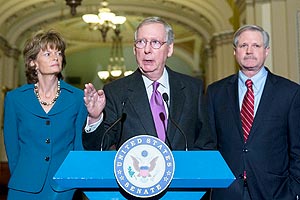Senate Approves Keystone XL Pipeline

The Senate voted 62-36 for the measure that would circumvent the administration review in progress for six years. Nine Democrats joined Republicans who backed the measure. Obama has said he wants to wait until the review is completed before deciding on whether to approve construction of the pipeline.
Differences with a version passed 266-153 by the House on Jan. 9 must be resolved before the legislation is sent to Obama, but supporters pledged to work through those quickly and send a final version to the president.
"This is about energy, jobs, economic activity, national security and building the right kind of infrastructure we need," Sen. John Hoeven (R-N.D.), a bill sponsor, said after the vote.
The bill was the first measure taken up by the new, Republican-controlled Senate. Lawmakers who back Keystone have sought for years to force Obama’s hand only to be turned away in the Senate when Democrats were in control. The vote was less than the two-thirds majority needed to override a presidential veto.
Backers say the project would create jobs and increase U.S. energy security by tightening ties with Canada, where the proposed TransCanada Corp. pipeline would originate.
“The Keystone infrastructure project has been studied endlessly — endlessly — from nearly every possible angle,” Senate Majority Leader Mitch McConnell (R-Ky.) said before the vote. “We need to build it.”
White House press secretary Josh Earnest reiterated Jan. 29 that Obama would veto the Keystone legislation. Sen. Charles Schumer (D-N.Y.) said supporters didn’t have the votes to override the veto.
The vote capped two weeks of debate that included votes on dozens of amendments, showcasing a commitment by McConnell to allow a more freewheeling discussion of legislation on the Senate floor.
Republicans overcame a stumble Jan. 26 when Democrats, objecting to limits on amendments they could offer, blocked a procedural vote. That fueled doubts Republicans could meet a goal of passing the bill this week.
The two sides agreed to debate additional amendments, and eventually nine Democrats joined Republicans to end debate on the measure earlier Jan. 29 and allow the final vote.
Senators adopted an amendment to promote energy-efficiency efforts and made other relatively minor changes.
Republicans blocked Democratic attempts to put the Senate on record saying climate change was a significant problem caused by the burning of fossil fuels. Language saying climate change was happening was added, though it didn’t ascribe it to man-made causes.
The $8 billion Keystone project would run through Montana, South Dakota and Nebraska, where it would connect to an existing pipeline network that extends to refineries along the U.S. Gulf Coast.
Polls show more Americans support the project than oppose it, though the political payoff for Republicans in backing it probably is small.
The fate of #KeystoneXL is in Pres Obama’s hands. If he rejects the pipeline it will be one of the most short-sighted decisions in memory.
— Lindsey Graham (@GrahamBlog) January 29, 2015
Proud to vote NO on #KeystoneXL pipeline. Great deal 4 Kochs + friends, bad deal 4 USA jobs in farming, fishing, forests. #NoKXL
— Senator Jeff Merkley (@SenJeffMerkley) January 29, 2015
Proud to support #KeystoneXL. A step in the right direction.
— Bill Cassidy (@BillCassidy) January 29, 2015

